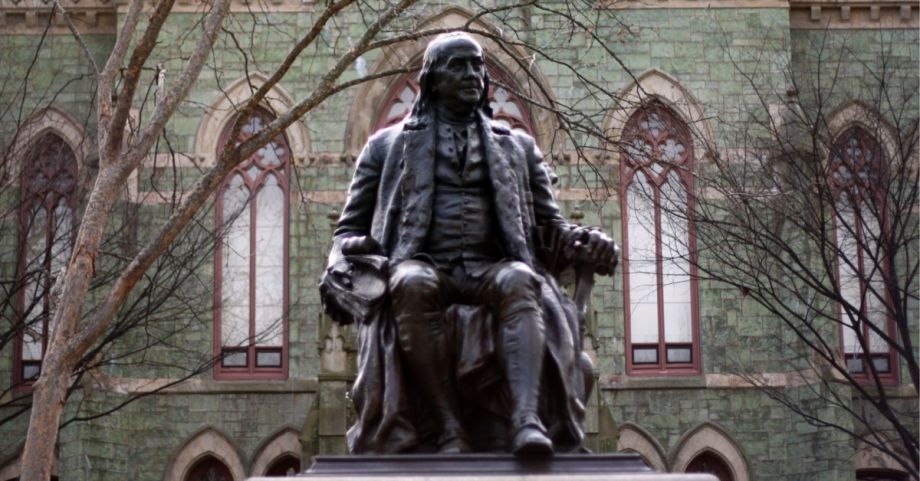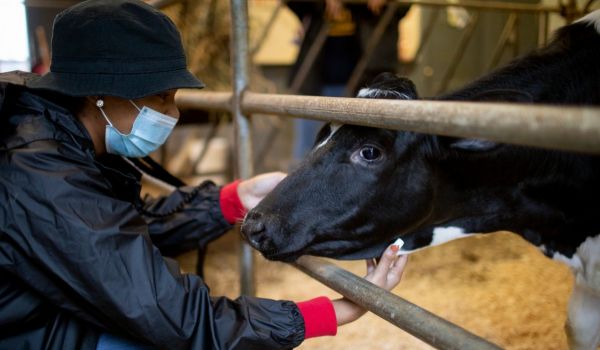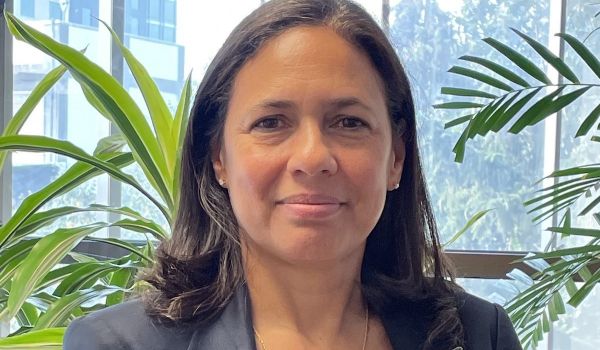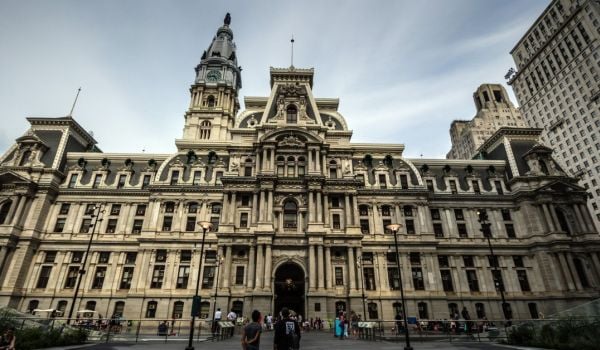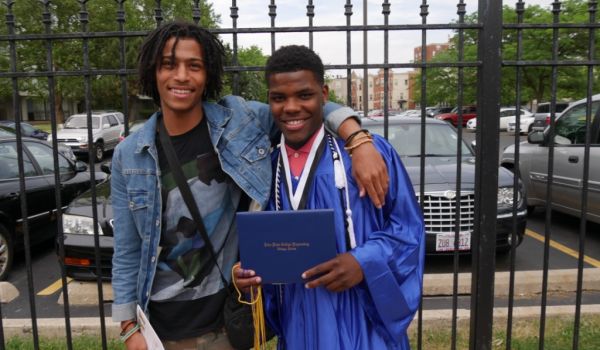At the University of Pennsylvania, a growing group of faculty and staff are for the first time issuing a collective call for for the Ivy League institution to eschew its privilege as a tax-exempt nonprofit and start paying at least part of what it would otherwise owe in property taxes annually to Philadelphia’s chronically underfunded public school system.
“The call really gathered strength this spring because of urgent fiscal crisis tied to COVID-19, and became even more urgent with calls for racial equity,” says Amy Offner, a Penn history professor and one of the 730 faculty and staff so far who have signed on to the campaign.
Penn for PILOTs calls for Penn to establish an agreement with the city to make “payments in lieu of taxes,” known as PILOTs, directly to a fund that would benefit Philadelphia Public Schools, where 52 percent of students are Black and 21 percent are Hispanic.
The petition started circulating among Penn faculty and staff in June, Offner says. They join students, local Philadelphia parents and public school teachers, labor organizers and others who have been making similar demands of the university for decades.
“We’ve been stunned by the enormous reservoir of support that clearly exists among staff at Penn,” says Offner. “We’re living in a time of rising expectations, with many people being involved for the first time. Some of us are people who study urban inequality, racial inequality, with scholarly expertise in these issues, and some are parents of public school children, graduates of public schools, or former public school teachers.”
Including its affiliated hospital system, Penn is the largest landowner in Philadelphia, but it has never paid PILOTs, aside from a brief period lasting from 1995-2000. Among the eight Ivy League institutions, only Penn and New York’s Columbia University do not currently have a PILOTs agreement in place with their local government.
A look around at the rest of the Ivy League doesn’t exactly reveal a totally rosy picture when it comes to PILOTs, however. Harvard University, while based across the Charles River in Cambridge, has a PILOTs agreement with Boston, but 2019 was the eighth year in a row that Harvard failed to meet its agreed-upon PILOTs amount.
Enid Eckstein and Jonathan Rodriguez are co-chairs of the PILOT Action Group, which formed in 2018 to coordinate research and advocacy around PILOTs in Boston, where tax-exempt entities own 49 percent of land in the city.
The idea that universities or hospitals provide public benefits that justify some public subsidy in the form of tax exemptions makes sense on paper. But increasingly these advocates are pointing out that those tax exemptions are just one more example of policies that create benefits that accrue disproportionately to white beneficiaries — such as the overwhelmingly white legacy admissions to Ivy League and other prestigious institutions — at the cost of decreased funding to overcrowded, understaffed public schools filled with disproportionately Black, Indigenous and other students of color.
“These university campuses have bright shining libraries and down the street there’s the Tobin School where every day educators have to pick up syringes from the playground, two blocks away from Northeastern,” Rodriguez says. “That’s the kind of dichotomy we see here in Boston.”
In Boston, after putting out its report, the PILOT Action Group embarked on some good old fashioned political education — holding town halls and other public gatherings to discuss the report in neighborhoods around Boston, inviting local representatives and partnering with other grassroots groups to host some of the meetings, like the Boston Ujima Project.
Those gatherings were both rooted in a broader context and aimed at more than just PILOTs.
For broader context, there was the continuing buzz around the 2017 Boston Globe Spotlight Series on wealth inequality, digging into a Federal Reserve study that found the median wealth for white households in Boston is $247,500 while for Black households in Boston median wealth is just $8.
“That really challenged institutions in Boston,” Rodriguez says.
In addition to PILOTs, those gatherings have talked about how universities procure goods and services to supply their privileged campus communities, as well as the endowments that provide funding for so much of that spending. Valued at $40 billion, Harvard’s endowment is the largest single source of income for that Ivy League university, providing $1.9 billion in funding for Fiscal Year 2019.
“PILOTs [are] the tip of the iceberg,” Eckstein says. “These institutions aren’t going anywhere, so we talk about how do they perpetuate structural racism in the community. There’s no point to protect endowments if it’s all going to perpetuate the injustices we’re all talking about trying to address.”
The PILOT Action Group has been around for just the past two years of a much longer debate about PILOTs, but Eckstein and Rodriguez say they have started seeing local politicians cite their report and mention the issue in more prominent spaces, sometimes to their surprise. Boston City Council Member Kim Janey, who represents predominantly Black neighborhoods in Boston, became City Council President at the end of 2019, and promptly announced that she would be forming a PILOT reform task force to improve and strengthen enforcement of the city’s various PILOT agreements.
“People are running with this now and I think that’s an important thing,” Eckstein says.
Eckstein and Rodriguez cite two contentious issues with the current PILOT program in Boston.
One is the property values at which the PILOT obligations get assessed — they’re currently assessed using the property value assessment from 2009, in the depths of a depressed real estate market during a financial crisis. The agreements stipulated that those property values would be reassessed after five years, but that has not yet happened. Meanwhile, commercial property values in Boston rose 55 percent from 2009 to 2017, according to the PILOT Action Group report.
The other contentious issue within Boston’s PILOT program is how nonprofits can include funding for certain university activities directly benefiting communities to cover up to half of what they promise to pay the city. So for instance, in 2019, the Crimson reported that Harvard’s agreement stipulated $12.5 million in PILOTs, but the university paid just $3.8 million in cash to the city, while also getting credited for $6.3 million in “community benefits.”
The problem that Eckstein and Rodriguez see with the “community benefits” contribution allowance is that it means the powerful, wealthy, privileged institution gets to dictate what activities it does to satisfy that piece of their obligation, as opposed to allowing that money to flow through public institution coffers. Nonprofits were supposed to provide regular reporting of what they are claiming credit for doing under the “community benefits” portion of their PILOTs, but the PILOT Action Group points out that reporting has been delayed or nonexistent.
“They always have this conservative argument that they won’t get the credit or ‘government is going to waste the money versus look at our community benefits we can provide.’” Rodriguez says. “Some of that community benefit spending is great but some is also wasteful, not-coordinated, not strategic. They don’t do too well partnering with people from the communities we’re talking about.”
“Harvard has a long history of being a collaborative and reliable partner to its host communities,” a university spokesperson told the Crimson.
While the COVID-19 pandemic has taken needed attention away from longer-term structural issues such as PILOTs, Eckstein and Rodriguez remain hopeful that the PILOT reform task force will result in some policy movement that comes about by the end of this year.
Power matters in Philly, too. The “Penn for Pilots” campaign has done a lot of work gathering information about their institution, but when it comes to specific policy demands, they’re actually co-signing a broader campaign that kicked off in May, led by Philadelphia Jobs with Justice, a coalition of local labor groups and other supporters. Their campaign is calling for major nonprofits such as Penn, Drexel University, Jefferson University and Health System to pay 40 percent of what they would be obligated to pay in property taxes directly into an “Education Equity Fund” that would be controlled directly by Philadelphia Public Schools. (Last week, the university said in a written statement provided to NBC10 that “The tax situation in each city and state is unique, and one of Philadelphia’s greatest strengths is its rich tapestry of nonprofit organizations, including colleges and universities, hospitals, museums, arts and culture, and social service providers.”
Just as in Boston, the Philly groups believe it’s important for the funding to flow through public institutions that are accountable to communities, as opposed to universities who are accountable to their boards of trustees. And while it’s true that university and hospital employees do pay local wage taxes in Philly, those taxes go into the city’s general budget while the school system, as in many cities, depends heavily on property taxes for its income.
“One of the points we’ve emphasized is PILOTs have to be significant, predictable, reliable payments,” says Offner with Penn for PILOTs. “Public education is really the cornerstone of the U.S. public welfare state. Everyone has a relationship to public schools and … [Penn for PILOTs members] all agree public schools, so long as they are funded by property taxes, need and deserve property taxes from powerful, wealthy institutions.”
This article is part of The Bottom Line, a series exploring scalable solutions for problems related to affordability, inclusive economic growth and access to capital. Click here to subscribe to our Bottom Line newsletter.

Oscar is Next City's senior economic justice correspondent. He previously served as Next City’s editor from 2018-2019, and was a Next City Equitable Cities Fellow from 2015-2016. Since 2011, Oscar has covered community development finance, community banking, impact investing, economic development, housing and more for media outlets such as Shelterforce, B Magazine, Impact Alpha and Fast Company.
Follow Oscar .(JavaScript must be enabled to view this email address)



